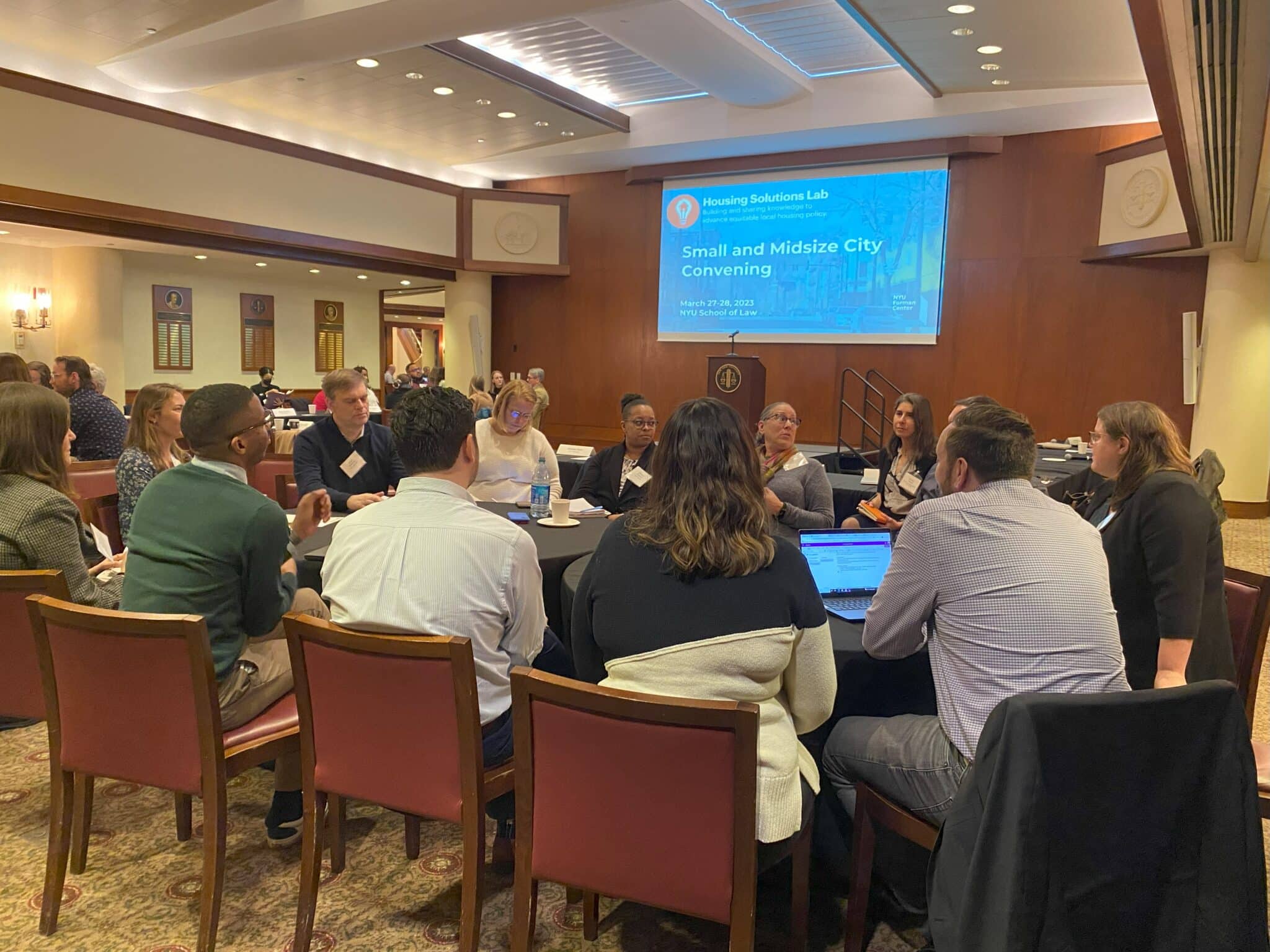June marks the Housing Solutions Lab’s second anniversary, capping a rich period of growth, adaptation, and learning with small and midsize cities. Since our 2021 launch, the Lab has helped dozens of cities tackle their housing challenges by analyzing local data, producing policy resources, providing technical assistance, and connecting housing leaders across the country.
As we embark on our third year of city engagements and ramp up our research on the impacts of local policies, we’re reflecting on what we’ve learned during these past two years. Here are a few of our takeaways, and how we are responding:
1. Small and midsize cities are wrestling with diverse and complex housing issues.
Small and midsize cities are taking on a wide range of housing priorities and challenges. While some localities like Portland, ME, and San Marcos, TX, are focused on developing new affordable housing and preventing displacement, cities such as Skokie, IL, and New Orleans, LA, are working to revitalize distressed neighborhoods and preserve aging housing stock. Given the vast differences in local contexts, there is no “one-size-fits-all” strategy for helping localities meet their housing needs. Cities need tailored policies and programs that recognize their unique economic, geographic, and political realities.
Recognizing these diverse needs, we continue to add resources to Local Housing Solutions that provide data, policy guidance, and case studies on a range of policy options for practitioners from a variety of local contexts to consider. We’re also leveraging the NYU Furman Center’s affordable housing expertise and working with partners from organizations such as Center for Community Progress, The CaseMade, Abt Associates, Bennett Midland, and Community Solutions to provide cities with personalized guidance and support.
2. State policies and funding streams are particularly important for small and midsize cities.
While local governments are often best positioned to understand their cities’ housing challenges, state policies and funding mechanisms can have a significant influence on how localities respond to them. In recent years, several states have enacted legislation to reduce restrictive zoning and encourage housing supply. Cities in states that require or incentivize more diverse and dense housing options–such as eliminating single-family zoning, permitting accessory dwelling units, or allowing residential conversions in some areas zoned for non-residential uses–have more tools available to produce denser and more inclusive housing options. Conversely, cities in states that restrict policy tools that can help facilitate local housing production–like inclusionary zoning programs–have fewer policy options available to them. How states administer federal funding may also be important for smaller cities that do not receive federal funds directly.
In the coming year, we will identify state models and resources to help bridge state and local approaches and illustrate how states can help cities increase local housing supply.

In the photo: Lab staff and city representatives met this year to discuss strategies for implementing housing plans.
3. Small and midsize city housing systems are evolving.
Small and midsize cities structure and administer their housing functions in ways that often differ from larger cities. While many large cities have robust dedicated housing departments that set policy and run programs, smaller cities may have fewer and more dispersed staff administering programs in housing, planning, social service, and economic development agencies. Some smaller cities that have only recently experienced housing affordability challenges are creating new dedicated housing departments. Others are exploring different options for structuring their existing housing systems and functions.
Through the Lab’s workshops, peer networks, and one-on-one technical assistance, we’re assisting cities as they examine their housing ecosystems and consider alternate models.
4. Equity is on the agenda, but progress is difficult.
Many small and midsize cities recognize and want to address entrenched housing disparities. City officials acknowledge the long-standing challenges of racial segregation and underinvestment in low-income communities and understand how systemic racism contributes to persistent housing inequalities. Some cities, like Minneapolis, MN, Baton Rouge, LA, Boulder, CO, and Louisville, KY, are taking steps to redress the legacy of racial segregation in their communities. Others, like Oakland, CA, are establishing equity frameworks and metrics to guide their policymaking. However, many localities are struggling to move from documenting housing disparities towards effective action to address them. We’re helping cities make progress on their equity goals by disseminating promising practices, detailed data indicators on housing and home ownership, and legal considerations for addressing racial disparities.
5. City governments are eager to engage residents.
Perhaps the most consistent takeaway we’ve learned from housing officials is that they are eager to improve how they communicate with and engage their community members and integrate lived experience into housing strategies. City officials increasingly recognize that good community engagement is proactive, authentic, and ongoing. But they also acknowledge that traditional community engagement tools and processes are often ineffective. Many localities are looking to reset their community engagement processes and strengthen relationships with residents and trusted community-based organizations. The Lab is working with partners like Hester Street Collaborative to identify and share effective community engagement models and help cities develop new approaches.
Listen to our Peer Cities Playlist to hear music featuring each of our LHS Peer Cities.
What's next for the Lab
Over the last two years, we’ve seen local housing policymakers and practitioners navigate complex challenges in the service of their communities. The Lab is honored to support and learn from cities, and we are heartened by the leadership and resilience of our city housing leaders.
Our work continues to evolve in response to our learnings and in pursuit of the Lab’s mission to advance more equitable, evidence-based local housing policies. In the coming year, we look forward to:
- Adding new online training modules and policy guidance to Localhousingsolutions.org to help cities develop comprehensive affordable housing strategies
- Developing new resources on practical strategies to advance racial equity
- Supporting housing and health system partnerships
- Providing training and peer learning opportunities for housing officials, and opportunities to bridge housing, health, and criminal justice sectors
- Convening workshops and “bootcamps” and hosting convenings for small and midsize city housing officials
- Launching our new Public Housing Authority Community of Practice, convening a diverse group of public housing agencies interested in developing a research agenda and partnering with us to explore and evaluate innovative practices
- Supporting research on innovative housing policies in small and midsize cities
- Disseminating research on Housing Choice Voucher success rates, rental arrears, and the impact of cash transfers on housing stability
We welcome feedback, ideas, and questions as we continue developing the Lab’s resources and initiatives. Please contact us at Ask the Lab.
